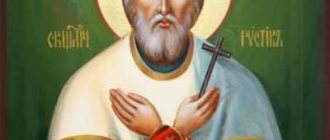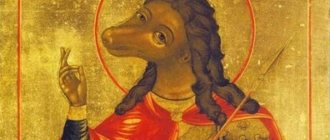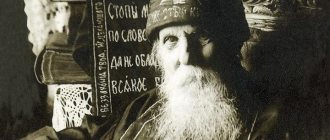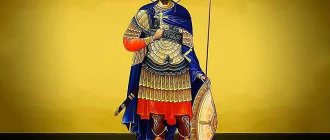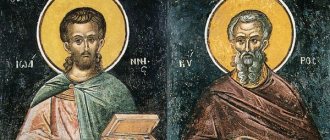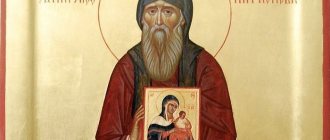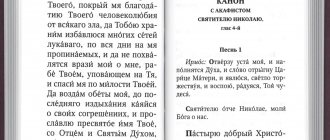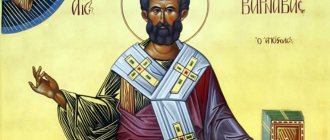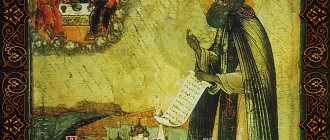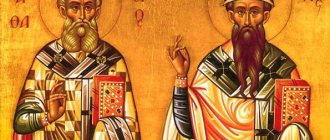If in the Soviet era only a person’s birthday was celebrated, today it has become relevant to celebrate name days. This article will help both the bearer of the name Denis and his relatives, because it will tell in detail what saint this boy, guy, man was named after. Remember: if you are a godmother or godfather of a boy, do not forget to buy a personalized icon (paper or body) for him! It will become little Dan’s personal talisman, and will also remind you of your care.
Hieromartyr Dionysius the Areopagite
There are few men in early Christian history who had such a complex and interesting fate as Dionysius the Areopagite, an Athenian philosopher and bishop who was one of the 70 first preachers. He personally knew almost all the apostles and, as some sources say, greeted the Mother of God.
The main value for the Orthodox Church is the theological works - “Areopagitica”, created by the hand and mind of the holy philosopher. In the Middle Ages, these works were one of the main sources of spiritual education. Although theological experts are still debating whether the Areopagite really belongs to the authorship of the Areopagite.
Biography of Dionysius the Areopagite
Basic information about the holy Athenian philosopher Areopagite is presented in the “Acts of the Holy Apostles” - a book of the New Testament.
Origin
Dionysius the Areopagite is Greek by blood. Born in Athens. The saint's family was noble and wealthy. In his youth, the Areopagite was seriously involved in education, studying the most popular sciences of that period. Later he went to Egyptian Heliopolis (a city northeast of Cairo), where he studied astronomy - a science that at that time was considered mandatory for philosophers.
In Heliopolis, the philosopher happened to witness a solar eclipse at the same hour when Christ was executed. Shocked by the terrible astronomical spectacle, Dionysius the Areopagite shouted: “Either the Creator of all things is suffering, or this is the end of the visible world!”
Returning to Athens with an excellent education, the young philosopher received a seat in the Areopagus - the Supreme Court.
Life
When the Apostle Paul arrived in Athens to eradicate the pagan faith and convert the Greeks to Christianity, the Areopagus summoned him for interrogation. The judges were interested in the essence of the new teaching. The Apostle read a sermon to the members of the Areopagus, by which Dionysius was deeply touched. The young philosopher was baptized, became St. Paul’s faithful assistant in his preaching work, and remained so for 3 years.
Dionysius the Areopagite could not help but visit Jerusalem; he wanted to meet the Mother of God. The philosopher eloquently told his mentor in a letter about his acquaintance with Mary and described the heavenly grace that the Mother of God exuded.
Dionysius went to meet Mary, accompanied by the holy Apostle John. And this is how the Areopagite describes the event: “As I appeared before the face of the Blessed Virgin, I experienced an indescribable feeling. A certain Divine radiance shone before my eyes and illuminated my spirit. I felt the indescribable aromas fragrant, and I was so delighted that I was unable, either in my weak body or in my spirit, to bear this harbinger and the beginning of eternal bliss and God’s glory.” Dionysius the Areopagite also arrived for the burial of the Virgin Mary in 57.
When Christianity became stronger in Athens, Dionysius was the first to receive the rank of bishop. But the cruel Emperor Nero, an adherent of paganism, ascended the throne and began persecuting Christians. In Rome, the holy apostles Peter and Paul were captured and executed.
After the terrible death of the holy mentor, Dionysius the Areopagite realized that he had to become a continuator of the apostolic work. Having joined the preachers Rusticus and Eleutherius, he set out to spread the word of God throughout the Western European regions of the Roman Empire.
Demise
The preachers traveled through German, Gallic, Italian, and Spanish lands, and were captured in Lutetia (present-day Paris). They were imprisoned and tortured in order to force them to renounce their faith in Christ. But the preachers remained adamant, for which they were sentenced to death by beheading.
On the last night before execution, angels appeared to the saints in prison. Dionysius the Areopagite performed the last liturgy in his life under angelic radiance.
In the morning the holy martyrs were executed. When the holy philosopher's head was cut off, he stood up from the scaffold, picked up his own head from the floor and, holding it in his hands, headed to the Christian temple, located 6 km from the place of execution. So the martyr indicated where he wanted to be buried. The Athenian philosopher was buried by a local woman, a follower of Christianity, whose name was Catulla.
Nowadays, the place where Dionysius the Areopagite found peace is called Saint-Denis, a suburb of Paris, located 9 km from the center of the French capital.
Veneration in Orthodoxy
In Orthodoxy, it is customary to venerate Saint Areopagite on the dates of the Council of the 70 Apostles: October 16, January 17.
Iconography
Icon painters paint Saint Areopagite with his theological work “Areopagitica” in his left hand. The icon depicts a wise gray-bearded old man in bishop's vestments.
Creative heritage
Until the 6th century, the theological works of the Areopagite were studied only by theologians of the Alexandrian Church. After universal recognition and interpretation, the works of the holy philosopher became one of the most significant for the formation of the worldview of Christians.
11 centuries passed, in the 16th century theologians carefully analyzed the Areopagitica. Many researchers have doubted whether the works were really created during the time of persecution of the first Christians, whether they were really written by the hand of the Holy Areopagite. Philosophers and theologians professing Catholicism and Protestantism have reduced the significance of theological writings. But in Orthodoxy, the Areopagitica still has high value as a source that has provided spiritual education to Christians for many centuries.
Theologians John of Damascus and Thomas Aquinas adhered to the philosophy of the Areopagite and used the works of the saint to write treatises and fight heretics.
It was through John of Damascus that Russian churchmen learned about the works of the holy Athenian philosopher. In 1371, Athonite monks translated Greek works, so they became available for review by Russian theologians.
“Areopagitiki” is a collection consisting of several books:
- “On Divine Names”;
- “On the heavenly hierarchy” - listing and explanation of the angelic ranks;
- “On the Church Hierarchy” - an explanation of the essence of church services, which are based on the sacred hierarchy;
- "Mysterious Theology";
- also the messages of the saint - to John the Theologian, hierarchs Titus and Polycarp, servants Gaius and Demophilus, priest Sopater, liturgist Dorotheus.
Dionysius of Athens explains in his books that approaching God without faith is unthinkable. Receiving Grace becomes possible after Baptism and the Eucharist. Church sacraments are dual: the essence in them is spirituality, and the image is sensuality. The names mentioned in prayers, theological writings, and church events are a step that brings one step closer to the knowledge of God.
Where to find relics
The holy relics of the Areopagite remained in the same place where they were buried many centuries ago - in Saint-Denis. They are located in the local basilica.
Prayer book
In church texts addressed to the holy martyr, his wisdom and fidelity to the faith are glorified.
Troparion
Having learned goodness and being sober in everyone, you have shrouded yourself in a sacred manner with a good conscience, you have drawn from the chosen vessel the ineffable and, having observed the faith, you have accomplished the same course, Hieromartyr Dionysius, pray to Christ God for the salvation of our souls.
Kontakion
Having passed through the heavenly gates in spirit, like a disciple to the third Apostle who reached Heaven, Dionysius, you have enriched the ineffable with all intelligence and illuminated those who sit in the darkness of ignorance. We also call: Rejoice, universal father.
Canon
Song 1
Irmos
Having traversed the water like dry land, and having escaped the evil of Egypt, the Israelite cried out: Let us drink to our Deliverer and our God.
Paul taught the divine, the heavenly, Dionysius, the seer, the heavenly secret abye and the broadcaster of God.
Having been illuminated by the grace of God, enlighten, blessed one, your souls who sing to you will understand the God-inspired teachings, Dionysius.
With a purified mind and soul, you were vouchsafed to bring forth the heavenly fertilizers of radiance, and those faces, Dionysius.
Theotokos: The luminous chamber, more than the mind of the incarnation, you appeared as the Creator of all: from You, the flesh, Mother of God, is our blanket.
Song 3
Irmos
The Supreme Creator of the heavenly circle, O Lord, and the Creator of the Church, Thou strengthen me in Thy love, the desires of the land, the true affirmation, the only Lover of Mankind.
Having surpassed the heavenly circles, Father, you have expounded to all the worldly ranks, and armies, and lordships, with lofty words and all-wise teachings.
Filled with the lofty vision, reverend, you theologized the names of the Divine, the Trinity theologian, blessed by grace, Dionysius.
Having been mortified by the present desire for God, and having firmly learned philosophy, the God-bearing organ, more than the mind, was a life-giving gift, Father.
Theotokos: By the Act, O Virgin, of the All-Effective Spirit, the body of the Lady of all bore fruit, in which the sin of the world was condemned and Eternal Life flowed forth.
Sedalen, voice 8
In the abyss of wisdom, teaching, the Spirit of depth, the Trinity, you preached one Divinity, reverend, having written off all the angelic ranks and the secret of those radiances, the wise God. Thus, having cleared away the lower hierarchy, you raised everything to one unity, hierarch Dionysius. Pray to Christ, the God of sins, to grant your holy memory to those who honor love.
Theotokos: The sun's cloud of rational, Divine Light, gold-plated lamp, undefiled, unglamorous, all-immaculate Lady, enlighten my soul, darkened by the blinding of passions of dispassion, with the dawn, I pray. And wash my desecrated heart with streams of tenderness, repentance with tears, and cleanse me from the tyranny of my deeds, so that I call to You with love: Mother of God of the Ever-Virgin, pray to Christ God, forgiveness of sins with my taxes, for I have hope in You, Thy servant.
Theotokos: You behold the Lamb, and the Shepherd, and the Savior, the Lamb on the Cross, exclaiming, weeping, and bitterly weeping, crying out: the world rejoices, accept Your deliverance, but My womb burns, beholding Your crucifixion, enduring mercy for mercy. Long-suffering Lord, abyss of mercy and inexhaustible source, have mercy and grant forgiveness of sins to those who sing Your Divine Passion by faith.
Song 4
Irmos
You are my strength, Lord, You are my strength, You are my God, You are my joy, do not leave the bosom of the Father and visit our poverty. Together with the prophet Habakkuk I call Ti: Glory to Your power, Lover of mankind.
You adorned the church deanery: in them, Father, you painted visionary images clearly with the scriptures of ugly forces; In this image all the faithful, the wise gods, and councils are secretly conducted and enlightened.
The streams of your theology, more pleasing to God, will water the flower beds of words, ever-blooming and planted on the rightness of theology: the unity of the Creature in Three Persons, you preached honest Unity of Command.
The strong angelic hierarchy, holy saint, desire and zeal for God, and a steady mania for the heights of the divine and incomprehensible, you taught God-wise, crying out by faith: Glory to Your power, Lover of mankind.
Theotokos: The Priest of salvation was Thy Son to all who sing Thee, and mentor, and enlightener, and truth, the Virgin, and deliverance. With this, we truly and divinely glorify Thee, the Mother of God, with one and the same wisdom.
Song 5
Irmos
Who didst thou cast me away from Thy face, O everlasting Light, and didst thou cover me with the alien darkness of the accursed? But turn me, and direct my path to the light of Your commandments, I pray.
The verb of your broadcast, like a kind of heavenly noise, enlarges the godless minds with the word of grace and divine commands, enlightening the hearts of the faithful with the brightest dawns.
You became like a merchant looking for good beads, you are all-rich, and you found one Bead, truly valuable, and, marveling at its god-giving dedication, you confessed God to the saint.
The source of wisdom, most wise father, you loved, and, possessed by zeal and love, you were great, and always streamlined the rivers of divine commands, O God-voice.
Theotokos: For Thou art joyful and good-doing, and has received beauty, all united by the will of the Creator, and by the divine kindness and enlightenment of good faith, the Mother of God, who has fertilized us.
Song 6
Irmos
Cleanse me, O Savior, for my iniquities are many, and bring me up from the depths of evil, I pray, for I have cried out to You, and hear me, O God of my salvation.
Lawfully philosophizing, you received the gift of wisdom, the divine theologian of Orthodox dogmas, the all-blessed one, you left, enjoying them, faithfully, you are blessed.
With a godly mind, with godly wisdom, we are fertilized; you have inclined your ear to the divine teacher, and you have acquired the worldly wisdom from him, Dionysius.
Your life is wonderful, your word is most wondrous, your tongue is luminous, your lips are fiery-inspired and spirit-moved, and your mind is tested, blessed father.
Theotokos: The voice of Gabriel joyfully, Virgin, we cry out for faithfulness, for from You, ineffably, the life-giving Creator came to us and was mixed with man, Lover of mankind.
Kontakion, tone 8
Having passed through the heavenly gates in spirit, like a disciple who reached the third heaven of the apostle, Dionysius, you have enriched the ineffable with all intelligence and illuminated those who sit in the darkness of ignorance. We also call: Rejoice, universal father.
Ikos
An angel from men, having become the great Dionysius in virtues, all, like a crylat, accustomed to the mind of heavenly minds. With those songs, like an angel, let us honor him, crying out to him like this: Rejoice, having led Christ with Paul; Rejoice, you who have converted many to Christ; Rejoice, destroyer of polytheism of temples; Rejoice, God's wise counsel; Rejoice, God-written book of secret treasures; Rejoice, divine tablet and heavenly mirror; Rejoice, for you have seen the Passion of the Lord; Rejoice, for you have hardened yourself for His sake; Rejoice, O fountain, flowing forth reason; Rejoice, drop, quenching madness; Rejoice, unflattering path of salvation; Rejoice, barrier to the passage of the wicked; Rejoice, universal father.
Song 7
Irmos
The fire of God was sometimes ashamed of God's condescension in Babylon, for this reason the youths in the cave, with joyful feet, like in a flower bed, exultantly girdle: blessed art thou, O God of our fathers.
Like a heavenly cloud that thirsts for the earth, your teachings anoint the ever-desiring hearts of the faithful and teach them to cry insatiably: Our father, God, blessed art thou.
With your godly mind you painted the bodiless minds and those, most blessed, hymns, having been divine, you punished the Church to sing: blessed is God our father.
Thou hast appeared, the friend of the All-Holy Spirit, in good spirit, and prophetically proclaiming that inspiration and manifestation, wise Dionysius, crying joyfully: blessed is God our father.
Theotokos: Behold, now the prophecy of Isaiah has been fulfilled: The Virgin was in the womb of God the Word and gave birth to the Giver of Life; To Him we all call: Blessed be God our Father.
Song 8
Irmos
With the sevenfold, the Chaldean tormentor furiously kindled the cave of the pious, and seeing that they were saved by the best power, they cried out to the Creator and Savior: bless the youths, sing to the priestesses, exalt the people to all ages.
Dionysius was as bright as a mirror, and having made the mind capacious for pure phenomena, he became all-rich in virtue, receiving rays of radiance more than the mind, and you cried out: bless the priests, exalt the people forever.
The most abundant grace was poured out in your lips, you offered the divine teachings, and you extended those minds to us more than the meaning and opened them more clearly and brightly, singing with faith: bless the priests, exalt the people to all ages.
Most famous for being you, Dionysius, the all-glorious metropolis of Athens, who brought you the all-sacred firstfruits to the All-Tsar, always singing: bless the fathers, sing to the priests, exalt the people to all ages.
Theotokos: Mother of God, All-Immaculate, consume my soul from the scabs and sinful ulcers: for you have given birth to a Son, who have the power to loosen those who are bound by sinful captivity from unsolvable bonds, the only Benefactor and the only Life-Giver.
Song 9
Irmos
The heavens and the ends of the earth were terrified at this, for God had appeared as a man in the flesh, and Your womb was more spacious than the heavens. Thus Thea, the Mother of God, the Angels and the people of the ranks are magnified.
The apostle was honored with the saints because you were a seer of existence and a fellow sufferer, and you were an accomplice of glory, and with those you strove for the vision of the body of the truly life-giving one and most honest Mother of God, Whom we worthily magnify.
You were the heir of the Divine Kingdom in heaven, as a legitimate bishop, Father, as an invincible sufferer, you dissolved the priesthood with the blood of a martyr. You have been honored with this special crown, O sacred Dionysius.
As if you have boldness towards Christ, hierarch, wise Dionysius, always pray to be delivered from temptation by those who piously sing to you, disciple of ineffable visions, as the secretly taught and divinely initiated priest of goodness.
Theotokos: Having conquered heresies bravely, reveal the honorable Church, even Christ, with His honorable blood, as the blessing of the acquisitive, joyful, truly Thy Son, and save from troubles and from the situation that beset us, Lady.
Svetilen
Ascending through virtues, you ascended to the heavens, more pleasing to God, and you came to know the ranks of angels, and all the highest stations, and the Trisolar Dawn, a skill from Paul.
Theotokos: Having envied me of a more divine and blessed life in heaven of old, the evil and malicious enemy, having driven me out of Eden, is put to death by Thy Nativity, O Theotokos.
Who is Dionysus?
Dionysus, the god of wine, burst into the measured life of the Greeks with his characteristic fun, frenzy and madness. The Junior Olympian is of Thracian origin. Also known by other names:
- Bacchus;
- Bacchus;
- Elder Dionysus;
- Zagreus;
- Liber;
- Dithyramb;
- Orthos;
- Trochee.
Dionysus had the following functions and powers:
- was responsible for the revival of vegetation in the spring;
- patronized farmers;
- taught people the craft of growing grapes and winemaking;
- sent madness to those who did not want to join him;
- considered the “father” of the theatrical genre of tragedy.
The parents of the god of wine and the vine are considered to be Zeus and Semele. The myth of the birth of Dionysus is shrouded in passion. The jealous wife of the thunderer Hera, having learned that Semele was pregnant, took the form of her nurse, and persuaded her to beg Zeus to appear in divine guise. Semele, when meeting with God, asked if he was ready to fulfill one of her wishes, and he vowed to fulfill her every whim. Hearing the request, Zeus tore out the still unripe fetus from his beloved’s womb and sewed it up in his thigh, and when the time came, Zeus gave birth to a son, Dionysus.
The cult of Dionysus in Ancient Greece was called Dionysia. The grape harvest holidays were called the Little Dionysia, accompanied by colorful performances with dressing up, singing, and drinking wine. The main Dionysias were held in March - in honor of the reborn god. Early versions of the Bacchanalia festival were held under cover of darkness and consisted of wild dancing maenads in a trance state, ritual copulation. The Death of the god Dionysus was played out in the form of a bull and the sacrificial animal was torn into pieces and the warm meat was eaten.
Other famous saints named Dionysius
In Orthodoxy, there are many holy men and reverend fathers who bear a Greek name. But the most famous to believers are Dionysius of Olympus and Dionysius of Radonezh.
Venerable Dionysius of Olympia
He lived in the 15th century, for some time he was a monk in the Athos monastery. Known as the founder and abbot of one of the oldest Macedonian monastic communities - on Mount Olympus.
The strict and ascetic ascetic attracted many people, instructed and taught. He knew how to find an approach even to hardened criminals and scoundrels, to guide them on the true path. Once a robber planned to take away everything valuable from the saint’s cell, but he ran into Dionysius. The abbot quietly and peacefully talked with the criminal, by the power of suggestion he forced him to return the loot and think about an honest life.
Dionysius of Olympia died in 1541. The holy abbot is remembered on January 24th.
Venerable Dionysius of Radonezh
Born in the 1570s in Rzhev, at the same time Job became the first patriarch in Rus'. Dionysius was orphaned early and was brought up in a monastery. When misfortune overtook the saint’s family - the tragic death of his wife and children, he took monastic vows. Later he was appointed rector of the Staritsa monastery.
In 1605, when False Dmitry I reigned, Patriarch Job was brought to the monastery in Staritsa under guard. Dionysius was ordered to keep him in captivity. But the abbot did not listen to the order and secretly brought provisions to the prisoner. In 1612, the Monk Dionysius, appointed archimandrite of the Trinity-Sergius Lavra, sent out messages calling for an army to be gathered for defense against the invaders. Then he had to defend the monastery walls from the army of False Dmitry II. When the Time of Troubles ended, Dionysius of Radonezh worked hard to restore the devastated monastery.
Among other monastic affairs, Dionysius translated theological books. Ill-wishers slandered the saint, allegedly distorting the texts. The monk was put in prison, tortured, he humbly endured the torment, because he had nothing to justify himself. When Patriarch Filaret returned from captivity, he acquitted the innocently convicted man.
Dionysius, the Elder of Radonezh, died in 1633. The saint is remembered on May 25th.
What is the fate and character of the bearer of this name?
- Early years. As a child, he is an unusually sociable and friendly boy. He not only loves making friends, he enjoys messing around with all the living creatures he sees (feeding pigeons, ducks in the park, feeding yard cats and puppies). It will be great if his parents give him a dog or at least a hamster. A furry friend will teach him how to take care of someone, as well as responsibility.
- School. The boy brings good grades. However, teachers may not like the fact that during lessons he cannot sit still for a long time; after only 15 minutes he begins to fidget, distracting his desk mate.
- Youth. Over time, the guy learns to be neat and persevering, and these qualities greatly help him in his studies. It often turns out that Denis is shamelessly lucky (for example, if he buys a lottery ticket, he will suddenly win, if not the main prize, then a large sum for sure).
- Mature years. This is a diligent, very principled man who cannot stand opinions that differ from his own. He may turn out to be a collector, collecting something from his school days until old age. He doesn’t waste money because he knows well where it comes from. His first marriage may fall apart (and perhaps the problem is that he chooses his wife not with his heart, but with his wallet).
If you are interested not only in the date of Dionysius’ name day (in the world of Denis), but also in the mark that his spiritual namesakes left on the world in general and our religion in particular, we suggest watching a not too long film about the Russian icon painter. The faces created by Dionysius from the Vologda region have survived to this day, and they are truly beautiful. Thanks to this video, you will briefly immerse yourself in the pious Russian Middle Ages, remembering many historical facts and expanding your horizons:
Angel Denis Day according to the church calendar
In past centuries, a newborn was named after the saint on whose day of veneration he was born. Today, parents give their baby a worldly name that they like. And the priest calls it church, which may not coincide with the first.
When to celebrate the day of the angel (name day) - you can ask the priest. This may not be one day if there are several saints bearing the name (as in the case of Dionysius). Then the first date following the birthday is considered a holiday. For Denis, name days can be dates dedicated to the saints indicated in the table.
| Month | date | Saints Dionysius revered in Orthodoxy |
| January | 17 | Athenian bishop and martyr Areopagite |
| February | 6 | abbot of the Olympic Monastery |
| March | 5 | martyr, novice of the Valaam monastery |
| 23 | Bishop of Corinth, creator of Christian written works, martyr | |
| 28 | Palestinian, beheaded in Caesarea for opposing paganism | |
| 29 | Righteous | |
| May | 4 | Pamphylian warrior who suffered for the faith of Christ in Perga |
| 19 | Thracian linguist, student of Aristarchus, creator of the first grammar | |
| 25 | Archimandrite of Radonezh | |
| 31 | Martyr of Lampsacus | |
| June | 10 | saint of God, who accepted martyrdom, Schemamonk Petushkov |
| 14 | icon painter Glushitsky, founder and abbot of the Vologda monasteries | |
| 16 | Byzantine martyr | |
| July | 8 | Elder of Athos, ktitor of Dionysiata - Monastery of John the Baptist |
| 9 | Archbishop of Nizhny Novgorod and Suzdal, Metropolitan of Kiev | |
| August | 13 | monk of Vatopedi, tortured by the Turks for his adherence to faith |
| 17 | Ephesian, one of 7 young men buried in a cave for abandoning paganism | |
| 31 | Trebian, suffered in Italy for his commitment to Christ | |
| September | 6 | Greek archbishop, theologian of Zakynthos (date of transfer of the relics) |
| 12 | Elder Ostrovsky, minister of the Oyat Vvedensky Monastery | |
| 19 | martyrdom reader from Alexandria | |
| October | 16 | hieromonk nicknamed Shchepa, recluse of the Pechersk Monastery |
| 18 | Bishop of Alexandria, theologian, public figure | |
| 25 | icon painter Glushitsky | |
| 28 | Saint of Nizhny Novgorod and Suzdal | |
| november | 4 | Ephesian |
| 14 | Glushitsky | |
| 23 | priest Shchegolev, cleric of Saratov, new martyr | |
| December | 3 | Dorostolsky, died a martyr for the firmness of his faith in Christ |
| 12 | Bishop of Corinth, creator of Christian works, martyr | |
| 30 | saint, theologian of Zakynthos |
The dates in the table are given according to the new calendar (Gregorian).
The name Denis was initially recognized as a secular version of the church name Dionysius. Since the beginning of the 20th century it has become the official form.
Attribute of Dionysus
In ancient works of art, Dionysus was depicted as a young beardless youth with feminine features. The most important attribute of the god is the staff of Dionysus or a thyrsus made of a fennel stalk topped with a pine cone - a phallic symbol of the creative principle. Other attributes and symbols of Bacchus:
- Vine. Twisted around a rod is a sign of fertility and the craft of winemaking;
- Ivy is believed to protect against severe intoxication.
- Cup - drinking it, the soul forgot about its divine origin, and in order to be cured it was necessary to drink another - the cup of reason, then the memory of divinity and the desire to return to heaven return.
The companions of Dionysus are no less symbolic:
- Melpomene - the muse of tragedy;
- Maenads are faithful followers or priestesses of the cult of Dionysus;
- the panther, tiger and lynx - felines symbolize his ascent and triumph and remind him that the cult came from the East;
- the bull is a symbol of fertility and agriculture. Dionysus was often depicted as a bull.

